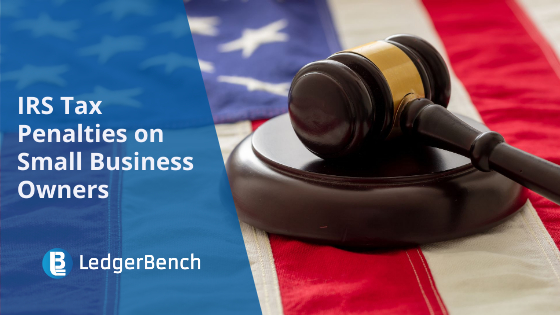
IRS Tax Penalties on Small Business Owners
Running a small business isn’t an easy task. At each step of the business growth cycle, a new challenge arises. However, one process that remains constant all throughout the business lifecycle, is Accounting and Bookkeeping.
Both these processes are the core financial processes for any business that eventually assist in easing the Tax Reporting complexities. Tax Filing is an yearly process that every business needs to comply with in order to avoid being penalised by the IRS. However, many times small business owners prefer doing their finances on their own which can result in penalties since they lack complete knowledge of the subject.
Here we will be discussing some of the common mistakes that business owners need to look out for, especially if they don’t want to seek professional help:
Underpaying estimated taxes
Lack of proper financial knowledge can at times prove to be costly for business owners. Failure to pay at least 90% of your current year tax bill can result in the IRS penalising your business.The IRS has the right to charge a penalty even if less is paid early or more has been paid later.
Suggested Reads – IRS Tax Relaxation Deadlines for Covid-19 (With State Regulations)
Failure to file penalty/late filing penalty
This penalty can be avoided by simply paying the taxes owed on time. The IRS can charge 5% a month as penalty for late filing which can go to a maximum of 25%. Also, it is interesting to note that even if you aren’t financially stable to pay your taxes, you should at least file your taxes since the penalties for not paying taxes are far lesser.
Failure to pay penalty/late payment penalty:
Yes penalty for not paying your penalties.The IRS can do this too. The failure to pay penalty rate is .5% a month on the outstanding tax balance. However, you can enter into an installment agreement to pay back the taxes owed.
Tax Penalties for Errors or Fraudulent Returns
Mistakes are a human nature and so is fraud and embezzlement. And the IRS has all the rights to penalize your business if they find out you have either knowingly or unknowingly filled false or incomplete information. Moreover, this penalty can be as much as 75 percent on top of the total owed. Therefore, it is very important that you include all your income when filing for tax.
Suggested Reads – COVID-19 | FFCRA Emergency Family Medical Leave Payroll Tax Credit
Not depositing employment taxes
Business owners who have employed individuals must deposit their share of taxes alongwith their employee’s taxes and failure to do so can result in IRS penalties.
Not separating business and personal expenses
There is also a penalty for not separating business and personal expenses since it can make it complex for the IRS to figure out the exact legitimate business expenses. This can further cause auditing complexities.
Words of Wisdom:
Paying your due taxes correctly on time is the simplest way to avoid IRS penalties!!

